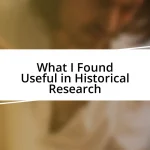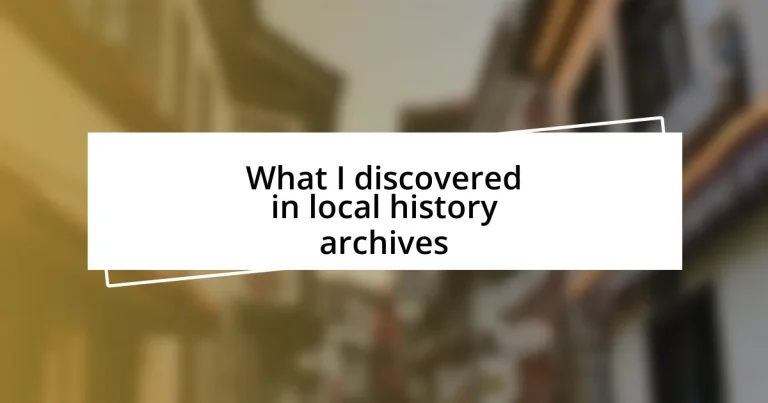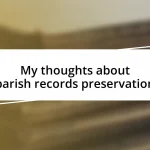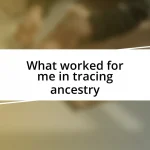Key takeaways:
- Local history archives provide emotional connections to the past, enriching our understanding of community identity and shared experiences.
- Researching local history fosters intergenerational connections, revealing parallels between past and present lives.
- Engaging with various document types, such as letters and photographs, uncovers unique stories that shape a community’s narrative.
- Collaborating with archivists and focusing research on specific themes enhances the uncovering of relevant historical insights.
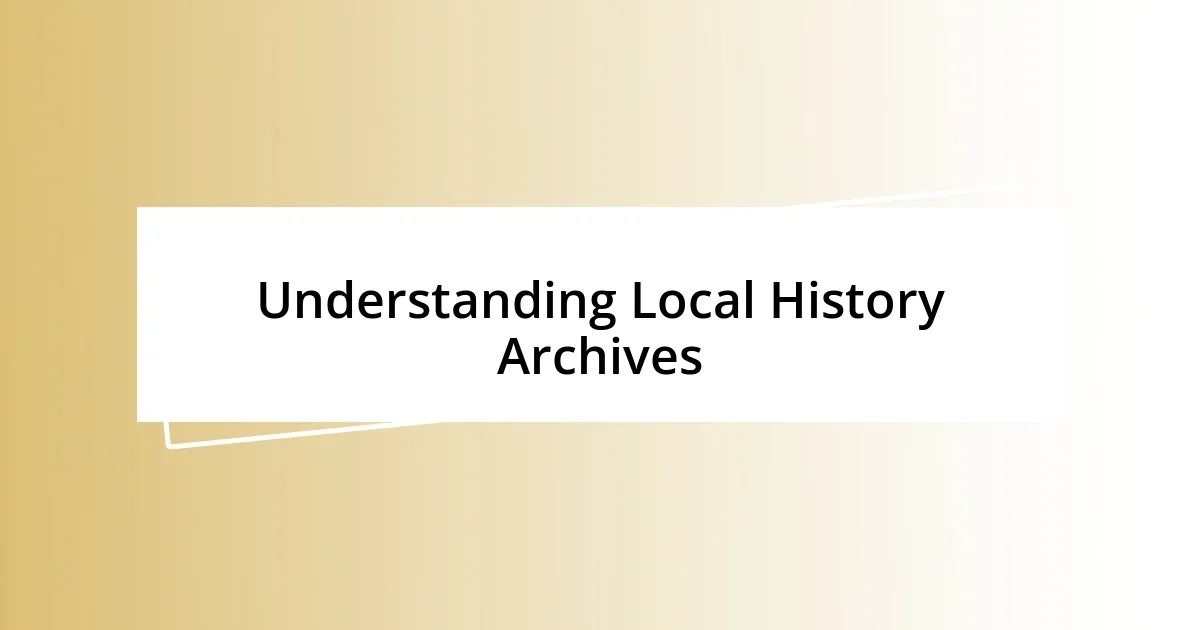
Understanding Local History Archives
Local history archives are treasure troves of stories waiting to be uncovered. I vividly remember the thrill I felt flipping through a dusty box of photographs, each snapshot revealing a moment frozen in time. Have you ever stumbled upon a piece of history that made your heart race? That’s the magic of these archives—they connect us not just to facts but to the emotions and experiences of those who came before us.
Navigating local history archives can feel daunting at first. I’ve spent countless hours sifting through worn-out ledgers and handwritten letters, each item detailing a unique narrative. It’s like piecing together a puzzle where every fragment adds depth and color to our understanding of the past. The allure lies in the unexpected surprises; I once found a letter that mirrored my own struggles, bridging a gap that I thought was insurmountable.
What truly sets local history archives apart is their ability to personalize history. When I discovered my town’s founding documents, I felt a profound sense of belonging. Isn’t it fascinating how a simple document can evoke such strong emotions? These archives don’t just house records; they embody the spirit of a community, making past events resonate in our lives today—reminding us that we are part of a larger story.
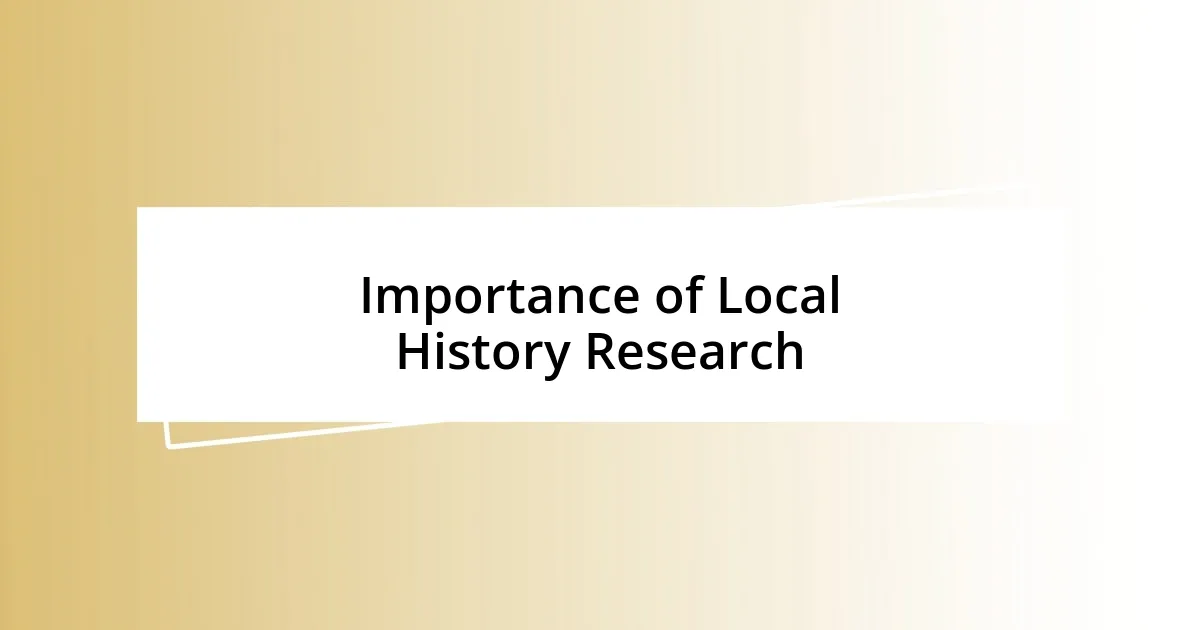
Importance of Local History Research
The importance of local history research cannot be overstated. It’s incredibly rewarding to discover how local events have shaped our community’s identity. I remember the excitement of uncovering how a small, seemingly insignificant event from decades ago impacted my town’s culture and cohesion. Experiencing that connection instilled in me a deeper appreciation for the places and people around me.
Moreover, local history research serves as a bridge between generations. When I delved into my grandmother’s childhood experiences through oral histories, I was captivated by the striking parallels between her stories and my own life. This exploration allowed me to feel her childhood joys and challenges almost as if they were my own. Have you ever thought about how these shared histories enrich our understanding of ourselves and one another?
Finally, the insights gained from local archives can stimulate civic engagement and preservation efforts. During my visits, I found records documenting community initiatives that sparked change. One particularly eye-opening moment was when I read how residents banded together to save a historic building. It made me realize that history isn’t just about the past; it can inspire us to take action today, fostering a community spirit that profoundly resonates with current challenges.
| Aspect | Significance |
|---|---|
| Identity Formation | Shapes community culture and personal identity. |
| Intergenerational Connection | Links past experiences with present realities. |
| Civic Engagement | Encourages action and preservation of local history. |
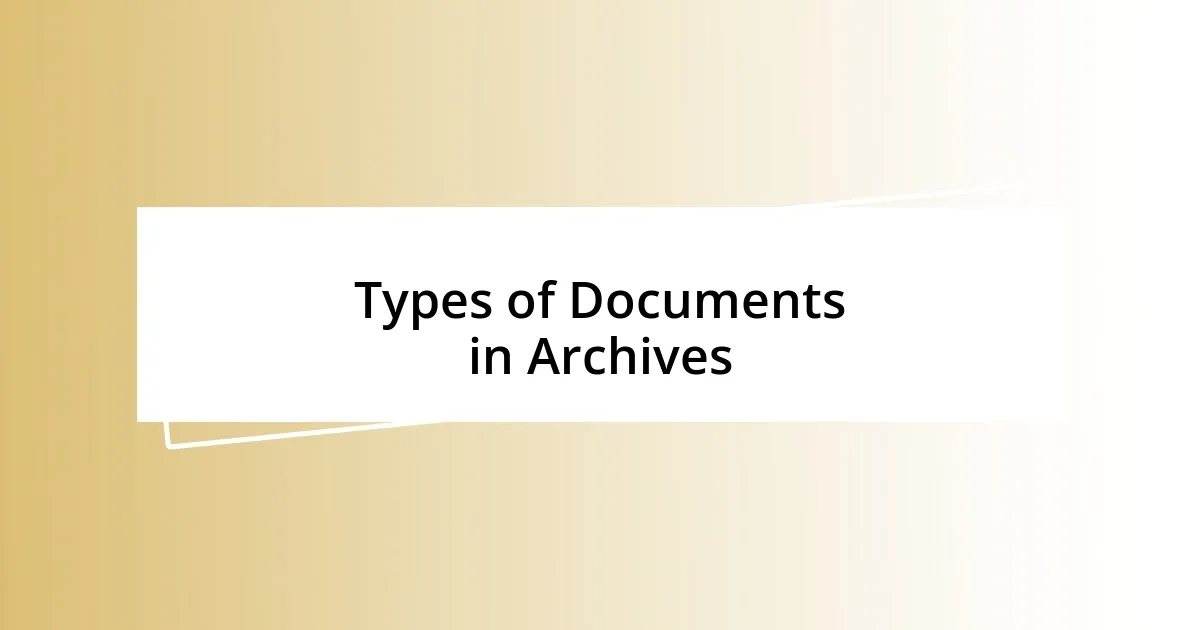
Types of Documents in Archives
As I ventured deeper into the archives, I realized that the variety of documents available could tell different aspects of our communities’ stories. From official records to personal letters, each type of document holds unique significance. I once stumbled upon a collection of old newspaper clippings that made me burst into laughter—they captured such a vivid picture of life in my town back in the day, with advertisements and social events that felt both nostalgic and strangely amusing.
Here’s a quick look at some common types of documents you might find in local history archives:
- Photographs: These visual records can evoke powerful emotions, capturing fleeting moments and people long gone.
- Letters and Correspondence: Personal letters offer intimate insights into individuals’ lives, revealing hopes, dreams, and everyday struggles.
- Official Records: Documents like birth certificates, marriage licenses, and property records provide foundational knowledge about a community’s lineage.
- Newspapers: Vintage newspapers serve as valuable time capsules, reflecting societal attitudes and events.
- Diaries and Journals: These personal writings often reveal a private side of history, filled with thoughts and feelings during different eras.
Each document type adds a distinct layer to the understanding of our shared history. I remember a time when I found a journal entry from a local resident during a significant event—such a raw account brought me to tears and made the past feel present and alive. It’s these types of discoveries that remind me of the rich tapestry of life woven through our communities, capturing emotions that resonate across time.
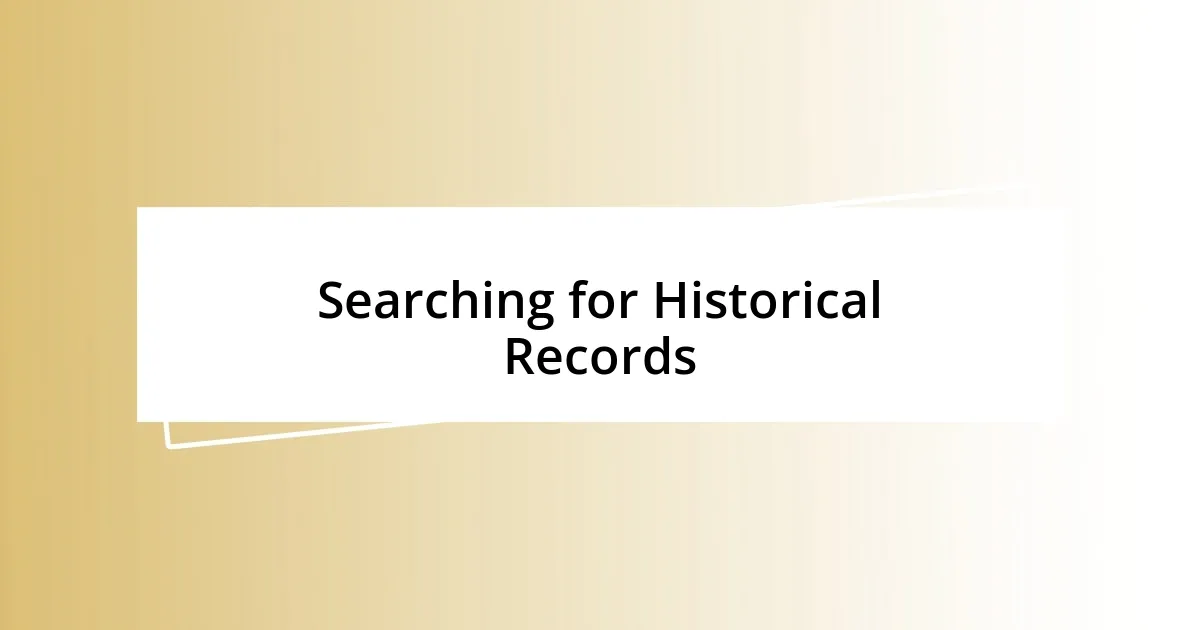
Searching for Historical Records
Searching for historical records can feel like embarking on a treasure hunt; each document you uncover adds a piece to the puzzle of your community’s past. I remember sitting in a dusty corner of my local archive, sifting through files, and feeling a thrill every time I stumbled upon a letter or photograph that whispered stories of lives once lived. Did you ever expect to resonate with a complete stranger’s experiences through their words?
As I navigated through the stacks, I noticed the hidden gems tucked away in files—like the time I found a faded blueprint of a historical building. It sparked an idea for a community project to restore the structure, igniting not only my own passion but also inspiring others to reconnect with our local heritage. What if our old neighborhoods held plans for their revival, waiting to be discovered?
Reflecting on my research journey, I believe there’s something deeply personal in every historical record. For instance, I once uncovered a birth certificate that traced back to an ancestor I never met, yet it stirred a longing to know more about their dreams and hardships. Have you ever had a moment when a document became a window into someone’s heart, bridging the past and present in a way that felt overwhelmingly profound? The thrill of exploring these archives lies not just in the facts, but in the stories and emotions they unveil.
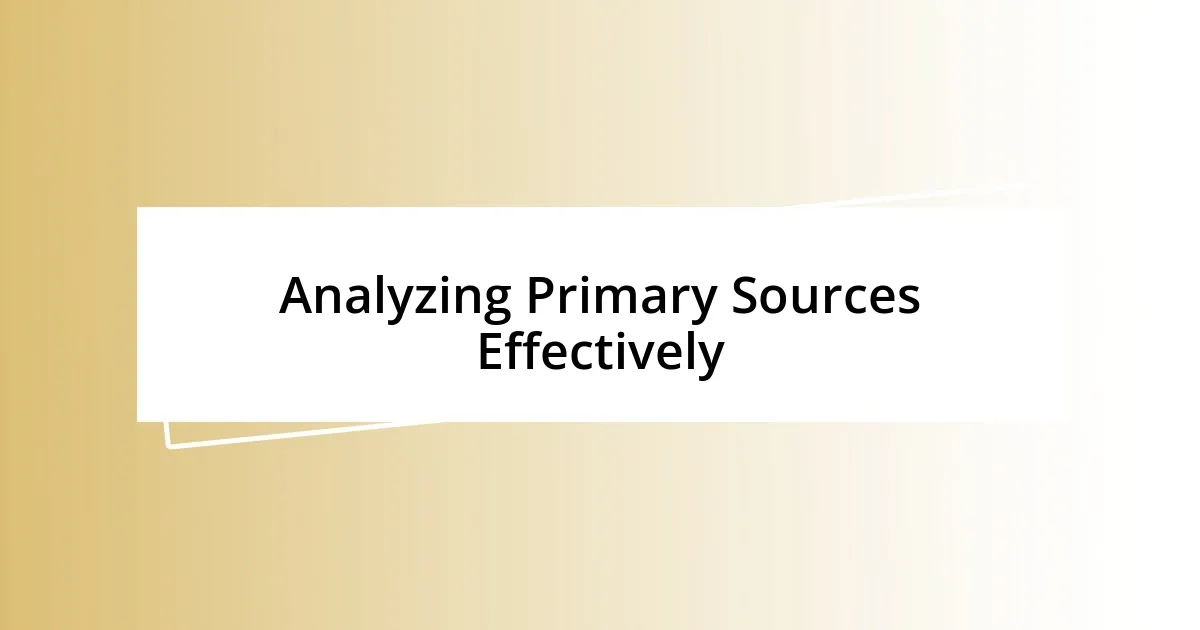
Analyzing Primary Sources Effectively
Analyzing primary sources is like peeling back layers of time, and it requires a keen eye and an open heart. I remember the first time I came across a soldier’s letter from World War II—each word was steeped in emotion, revealing not just the historical context but the humanity behind it. Have you ever felt like you were standing beside someone, sharing a moment across the decades? That’s the magic of truly engaging with primary sources; it’s about connecting with the lives that came before us.
When I analyze a document, I always ask myself, “What was the author trying to convey, and what circumstances influenced their perspective?” Context is key! I encountered a diary entry written during a local economic downturn, and it struck me how the writer eloquently expressed despair and resilience. This personal lens provided a depth to the historical narrative I hadn’t anticipated. Isn’t it fascinating how a single page can encapsulate both the personal and the collective experience during a turbulent time?
I find it helpful to take notes while examining primary sources, jotting down initial thoughts and questions that arise. This process transforms passive reading into an active dialogue with the document. For instance, while perusing an old town meeting record, I noted the varied community voices and arguments over local governance. It was a treasure trove of opinions and values from the past. What insights might we gain from those voices if we take the time to listen? The stories embedded in primary sources are waiting for us to unpack—each analysis offers a fresh perspective on our shared history.
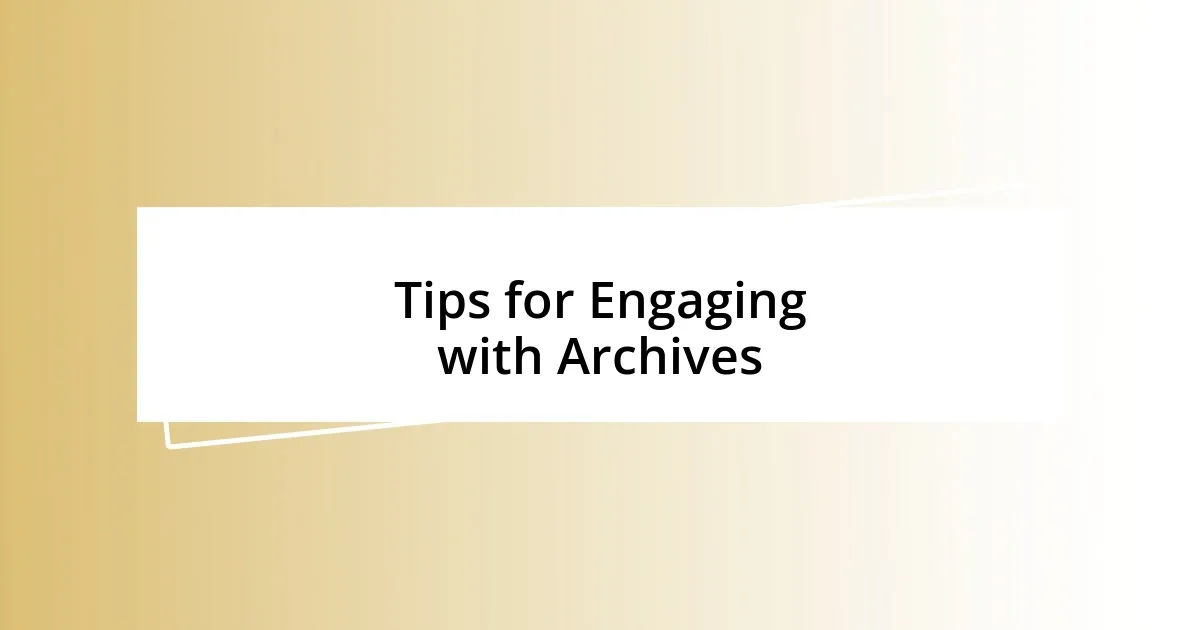
Tips for Engaging with Archives
Engaging with archives can feel overwhelming at first, but I’ve learned a few strategies that make the experience rewarding. One tip that I always emphasize is to come prepared with specific questions or themes in mind. For example, during a visit to a local archive, I focused on the history of immigration in my town. This focus helped me streamline my searches and led me to discover incredible stories that might have been buried in the endless stacks. Have you ever found clarity in your research by honing in on a certain topic?
Another approach is to embrace the collaborative spirit of archival work. I once attended an event at my local history museum where volunteers shared their research discoveries. It sparked conversations and even led to partnerships in uncovering more about our community’s heritage. There’s something magical about connecting with others who share your passion for history; sometimes, a simple exchange can guide you toward resources you hadn’t considered. Isn’t it amazing how collaboration can open new doors to understanding your past?
Lastly, don’t hesitate to ask archivists for help. I recall a particularly fruitful discussion with an archivist who guided me toward a collection of oral histories I wouldn’t have discovered on my own. Their expertise can provide invaluable insights into navigating the archives and understanding the materials. Have you reached out to a professional, and found that it transformed your research journey? Engaging with an archive isn’t just about the documents; it’s also about the people who can help illuminate your path.





